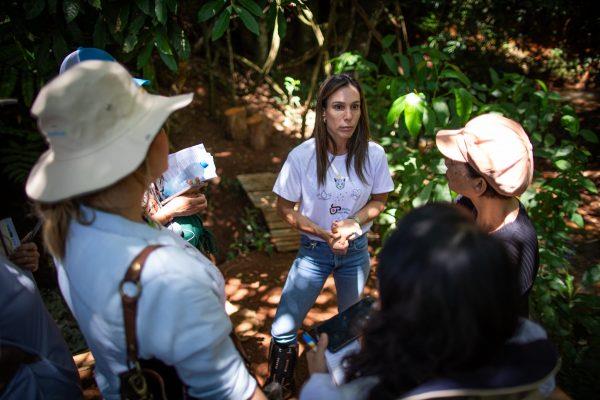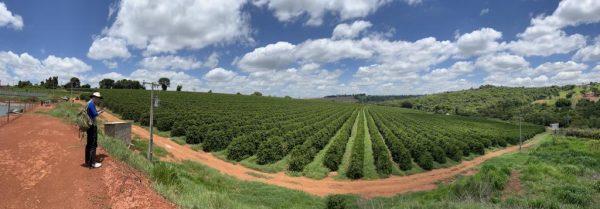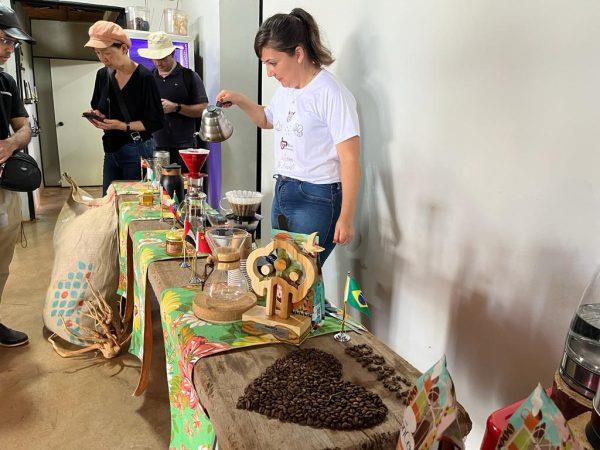(MENAFN- Brazil-Arab News Agency (ANBA)) São Paulo – In 2015, pharmacist Juliana Rezende Mello took charge of her family's land, Fazenda Santa Bárbara , and began producing specialty coffees in the city of Monte Carmelo, in Brazil's state of Minas Gerais' Cerrado Mineiro region.
Currently, with over 230,000 trees planted on 63 hectares, the Farm sells green coffee abroad and launched its own specialty coffee roastery brand, MonCerrado , with three varieties: Natural (82 points), Vulcão [Volcanic] (83 points), and Fermented (85 points).
Mello said she didn't know much about farming and started learning about coffee and the Cerrado biome. With a mind on the best processes regarding sustainability and family succession, in addition to flavor, she was concerned, from the beginning, with delivering a quality product with good practices, taking into account the farm's ecosystem, water springs, and fauna such as armadillo, jaguar, pampas deer, with an eye on regenerative agriculture.
Today, the coffee grower is one of the most prominent representatives of the Cerrado Mineiro region. The farmer received a group of journalists last week, to whom she told about the specialty coffee production process and the farm's projects focused on regenerative agriculture.
She also showed the recovered springs and the area with native bee hives, which have over 30 families of stinging and 17 stingless bees. Both projects received support from the Brazilian National Rural Learning Service (SENAR).
“I want my grandchildren to come and drink water from the spring,” said Mello, who has two children, a teenager and a toddler.

Visit to the restored spring
With the circular economy in mind, the coffee straw, which contains potassium, is used as a biofertilizer mixed with animal manure, rich in nutrients. The spaces between the coffee plantations receive a mix of cover crops that also act as bio-inputs, reducing the use of chemical fertilizers by 30%, keeping pests under control, and improving the microbiota of the coffee terroir.
The farm has photovoltaic panels to capture solar energy and a six-meter-deep water pocket that stores rainwater for drip irrigation, which accounts for 70% of the water used on the farm.
In farming, coffee feels the effects of climate change with a drop in productivity per hectare. Last year, with the drought, production output reached only 50% of the expected amount.“Drought severely affects agricultural production. With extreme weather events, damage is certain. There is no production more affected by climate effects than agriculture,” said Sueme Mori, director of International Relations of the Brazilian Confederation of Agriculture and Livestock (CNA).
Fazenda Santa Bárbara has certifications for management, social, agricultural, and environmental practices and has a laboratory to guarantee and control the quality of its coffee. The farm also adopts biodefensive products and works with social and environmental sustainability projects, among other initiatives.
“The less interference in farming, the more quality and complexity in the cup. It's a win-win relationship. The farmers win for themselves, for the community, and for agricultural production,” said Mello about sustainable practices.

Fazenda Santa Bárbara coffee plantation
In addition to the farm, the delegation also learned about the work of the Monte Carmelo Cerrado Coffee Growers Cooperative ( MonteCCer ) and its process of grading the beans and storing them from arrival to distributing the coffee to the members. Fazenda Santa Bárbara is a cooperative member.
The superintendent director of MonteCCer, Regis Salles, informed that in addition to the 192 cooperative members, other customers store their coffee in the cooperative's warehouse.“This is an extension of the cooperative members' farm,” said Salles. MonteCCer has warehouses, a q-grading laboratory, a certification area for good practices, technical assistance, a quality laboratory, and a coffee sales network, among other services.
Green coffee from Fazenda Santa Bárbara has already been exported to Singapore, other Asian countries, Norway, and other European destinations.
MonCerrado

MonCerrado coffee tasting at the end of the visit
The specialty coffee brand MonCerrado is an Agro project member. CNA developed the project in partnership with the Brazilian Trade and Investment Promotion Agency (ApexBrasil). The idea is to encourage the export of roasted coffee with higher added value.
The initiative aims to expand Brazilian exports by encouraging small and medium-sized producers to close deals with other countries. The program includes awareness raising, training, support in export plans, customized consultancy, participation in B2Bs, and support from international offices, among other services.
Cerrado Mineiro
Cerrado Mineiro was the first coffee region in Brazil to obtain a Geographical Indication (GI) seal, which attests to quality and adds value to products. The region has over 4,500 coffee farmers who produce, on average, 35 bags per hectare. This volume corresponds to 20% of the state's total, and around 70% of the bags are exported.
For the 2023/24 harvest, coffee production in Cerrado Mineiro is expected to reach 6.9 million bags, 13% of total Brazilian production. The average output in recent years was six million bags in an area of 234,000 hectares.
The region has altitudes of 800 meters to 1,300 meters, with a flat topography, a hot climate in the summer, and a dry climate in the winter, favoring the production of specialty coffee.
Minas Gerais
Minas Gerais is Brazil's leading coffee-producing state, producing 99% Arabica species. Minas Gerais' production represents around 52% of the coffee produced in Brazil, based on the 2023 harvest.
From January to August this year, coffee accounted for 36% of the state's agribusiness foreign sales. In that period, 12.8 million bags were shipped to 87 countries, mainly the United States, Germany, Italy, and Japan.
The ANBA reporter traveled to the region at the invitation of CNA.
Translated by Elúsio Brasileiro
Wenderson Araujo/CNA
Wenderson Araujo/CNA
Bruna Garcia/ANBA
Bruna Garcia/ANBA
The post Fazenda Santa Bárbara produces sustainable specialty coffee appeared first on Agência de Notícias Brasil-Árabe .
MENAFN16112023000213011057ID1107439189